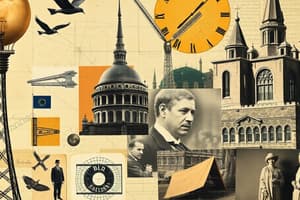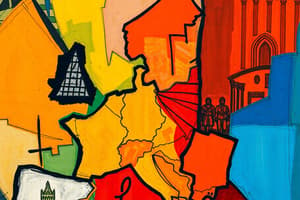Podcast
Questions and Answers
When did the early modern period begin?
When did the early modern period begin?
- 1700s
- 1300s
- 1450s (correct)
- 1600s
What key invention led to innovations during the 19th century?
What key invention led to innovations during the 19th century?
- Gutenberg's printing press
- Railways
- Steam ships
- Internal combustion engine (correct)
What marked the beginning of the late modern period?
What marked the beginning of the late modern period?
- Gutenberg's printing press invention
- American Revolution
- Industrial Revolution in England (correct)
- French Revolution
What enabled the Renaissance and Reformation?
What enabled the Renaissance and Reformation?
What replaced king and church authorities during the Modern Age?
What replaced king and church authorities during the Modern Age?
Which period does the Early Modern period bridge?
Which period does the Early Modern period bridge?
What marked the emergence of modern science during the Early Modern period?
What marked the emergence of modern science during the Early Modern period?
What inventions expanded world trade and commercial activity from the late Middle Ages?
What inventions expanded world trade and commercial activity from the late Middle Ages?
What did the Scientific Revolution replace as the dominant view of nature?
What did the Scientific Revolution replace as the dominant view of nature?
What did the Early Modern period overcome, marking the barriers between science and mechanical arts?
What did the Early Modern period overcome, marking the barriers between science and mechanical arts?
Flashcards are hidden until you start studying
Study Notes
Early Modern Period
- Began in the late 15th century and lasted until the late 18th century.
- Represents a transition from the Middle Ages to modern history.
Key Inventions and Innovations
- The printing press, invented by Johannes Gutenberg, revolutionized the spread of information and ideas.
- Innovations in communication and transportation during the 19th century facilitated industrial growth.
Late Modern Period
- The late modern period is generally considered to start in the late 18th century, coinciding with the French Revolution.
Foundations of Renaissance and Reformation
- The Renaissance and Reformation were enabled by a revival of classical learning, humanism, and advancements in printing technology.
Shift in Authority
- During the Modern Age, traditional power structures of kings and the church were gradually replaced by secular governments and individual rights.
Bridging Historical Periods
- The Early Modern period bridges the Middle Ages and the Modern Age, encompassing significant cultural, social, and political transformations.
Emergence of Modern Science
- The scientific method and empirical research marked the emergence of modern science, promoting systematic inquiry and experimentation.
Impact on Trade and Commerce
- The late Middle Ages saw inventions like the astrolabe and improvements in shipbuilding, which broadened world trade and commercial activities.
Scientific Revolution
- The Scientific Revolution replaced Aristotelian doctrines as the prevailing view of nature, introducing a scientific framework for understanding the physical world.
Barriers Overcome by the Early Modern Period
- The Early Modern period dissolved the barriers between science and mechanical arts, integrating practical knowledge with theoretical exploration.
Studying That Suits You
Use AI to generate personalized quizzes and flashcards to suit your learning preferences.




